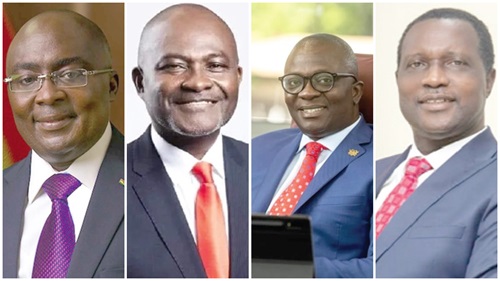A Good friend once said to me, “my father is not a God of second chances.”
I often think of that because there are people or situations we encounter in life where we may want a second chance to make it right.
I am sure we have all encountered people in our lives and on whose toes, we may have stepped, consciously or unconsciously, who vowed never to forgive us.
But I believe in the importance of showing grace and appreciating the power of redemption.
Does showing grace and offering redemption belong in the political realm as well?
Since the 2024 election and with the announcement of the New Patriotic Party’s (NPP) 2028 presidential primary slated for January 31, 2026, one of the many emerging conversations about Dr Mahamudu Bawumia’s candidacy is the question of political grace and redemption.
The question is simply this: Should the party retain him or go with a different candidate for the 2028 election?
To borrow the words of my good friend — should the NPP delegates be “Gods” of second chances and re-elect him as flag bearer come January 31, 2026? In seven months, the delegates will make that decision.
NPP primary delegates
Let’s refresh our memories with the party’s historical record on selecting flag bearers for presidential elections. In 1992, their candidate (late Prof. Albert Adu Boahen) lost the election.
In the presidential primaries for the 1996 election, although the late Prof. Adu Boahen contested, he lost to former President John Agyekum Kufuor.
In my book “Notes from the Public Square: What Ghanaians Said and How They Felt About Kufuor’s Presidency”, I asked the former president about his experiences with primaries.
His essential point, as I understood it, was that primaries differ and the questions driving the internal contest that led to his loss in the 1992 primary were different from those that led to his victory as flag bearer for the 1996 and 2000 election.
Mr Kufuor lost the 1996 election but was re-elected flag bearer for the 2000 election which he won.
The party’s next competitive primary was electing a flag bearer for the 2008 election.
They did so by choosing former President Nana Addo Dankwa Akufo-Addo who narrowly lost that election.
Party delegates, however, chose him again for two subsequent elections (2012 and 2016). In all three chances given him by the party, he lost twice and won once.
So, on the historical record, NPP primary delegates can be described as “Gods” of second chances as seen in how they treated Mr Kufuor and Nana Akufo-Addo.
Will precedent be followed?
But being “Gods” of second chances does not necessarily mean party delegates will repeat what happened in the case of Mr Kufuor and Nana Akufo-Addo.
In my estimation, there are three key things that I believe will play a role in shaping the decision of the delegates keeping in mind that the party has one singular goal — to return to power.
First, the slate of candidates in the race. Given the singular goal of winning and returning to power, delegates must confront this question “who is best positioned to help the party win the 2028 election?”
And here, the political pedigree of the candidates and their broad appeal beyond the party must be weighed carefully.
The base of the party alone is not enough to win any presidential candidate the general election. Mr Kufuor and Nana Akufo-Addo never stopped making the argument that despite their losses, they were still the best candidates to lead the party to victory. And that is what Dr Bawumia must never stop doing.
Second, is the answer to the question: Why did the party lose the 2024 election?
If delegates believe the candidate was the main reason, then the prospect of a second chance dwindles.
If they believe it was other factors other than the candidate, then the prospect brightens.
On this point, I am of firm conviction that the nature of the political winds blowing in 2024 was such that no candidate could have won the election for the NPP.
Check Ghanaian sentiments expressed in Afrobarometer Round 9(2022) and 10 (2024) and you will appreciate why I make this assertion.
Third, is the lifespan of the political liability of the party’s record in office that led to the 2024 loss.
If that record has a short lifespan and becomes less potent as time passes, then the prospect of a second chance brightens
It lightens the burden of dealing with being “tainted” by the record.
Alternatively, if that record has a long lifespan and continues to remain potent and easily weaponised even in an intraparty contest, then a second chance dims.
In the end, only one candidate will emerge as the winner.
The primary, undoubtedly, promises to be intensely competitive.
So, I ask again - will the party delegates be “Gods” of second chances?
The writer is the Project Director, Democracy Project.

